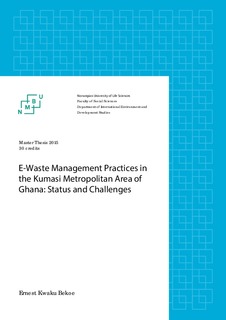| dc.description.abstract | In contemporary times, the small West African country of Ghana has seen a popular and extended demand for ICT, electrical and electronic devices such as personal computers, mobile phones, TV sets and fridges nationwide. However, most of these electrical and electronic gadgets contain known hazardous and with the seemingly lack of adequate e-waste management laws and an effective infrastructure to handle their end-of-life by products, the country inadvertently faces a public health and environmental catastrophe in the long term.
This qualitative research paper takes a look at the rising e-waste menace in Ghana, with special reference to the Kumasi Metropolitan City, which has seen a tremendous increase in the amount of e-waste being generated over the past decade. The paper unearths the current management practices for e-waste generated in the city, which is presently dominated by the informal sector; processing 95% of all e-waste currently generated through a well stratified system including collection, refurbishing, recycling and disposal, as against the 5% the formal sector processes.
Further, the paper takes a look at the existing institutional and regulatory framework policies that has been put in place to guide the management of hazardous, solid and radioactive waste generated within the city, including the various local government, Environmental Protection, Sanitation and Assessment Acts.
In addition, some major challenges that hinder the effective management of e-waste in the metropolis are clearly established, as it came to light during the study the absence of an updated legal, policy framework to guide the activities in the growing e-waste management sector, as well as the unavailability of proper recycling facilities posed as the major obstacles. Also, low levels of public awareness and lack of technical knowledge and skills on the part of both officials and artisans were the other challenges facing the effective management of e-waste.
Finally, the paper throws more light on some of the associated safety, health and environmental impacts of e-waste management in the metropolis, as well as making frantic appeals to the Ghanaian authorities by way of recommendations to formulate and impose the appropriate guidelines and policies in order to bring better environmental control into the thriving ICT sector. | nb_NO |

